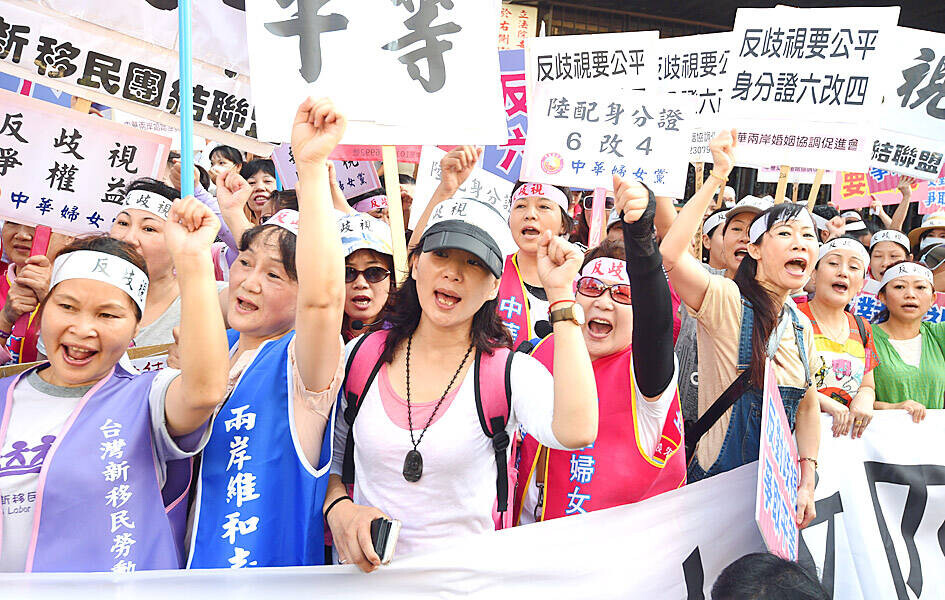
Taipei, Taiwan - Approximately 10,000 China-born spouses in Taiwan who have obtained "permanent residency" status are at risk of losing their qualification due to their failure to submit proof of household deregistration from mainland China.
During a Legislative Yuan meeting on Wednesday, Chen Chien-cheng (陳建成), deputy director-general of the National Immigration Agency (NIA), stated that the majority of China-born spouses have already submitted the required documents. However, around 10,000 individuals have yet to do so, and the NIA has notified them accordingly, he added. Reasons cited for the delay include health issues and difficulties related to the COVID-19 pandemic.
"Permanent residency" is an intermediate residency status that allows China-born spouses to apply for household registration and eventually obtain Taiwanese citizenship. Acquiring this status involves progressing through "family-based residency" and "long-term residency" stages, and crucially requires submitting proof to the NIA that their household registration in mainland China has been canceled.
Article 9-1 of the "Act Governing Relations Between the People of the Taiwan Area and the Mainland Area" (Cross-Strait Act) stipulates that "People of the Taiwan Area shall not have household registration in the Mainland Area," and those who violate this are to be "deprived of their status as people of the Taiwan Area and the rights derived therefrom."
Furthermore, China-born spouses who obtained "Taiwan Area resident status" before the implementation of this article on March 1, 2004, were required to deregister their Chinese household registration and submit the relevant proof to the Ministry of the Interior within six months of the article's enforcement.
Mainland Affairs Council (MAC) Deputy Minister Liang Wen-chieh (梁文傑) explained that authorities are conducting a comprehensive review of those who have not submitted the necessary proof, and the legal basis for this review lies in the Cross-Strait Act. Liang added that prior to this recent widespread review, the NIA would only take action if such facts were reported.
According to Chen, as of Wednesday, the "Taiwan Area resident status" of 676 individuals has been revoked. He stated that for the 10,000 individuals who have yet to provide the required proof and face difficulties in obtaining it, the NIA will collaborate with the MAC and the Straits Exchange Foundation (SEF) to seek practical solutions. The SEF is a semi-official organization established by the Taiwanese government to handle technical issues related to China.
Liang noted that both the NIA and the MAC have received numerous inquiries from the concerned China-born spouses, with some providing reasonable explanations while others offered various less convincing reasons.
A source familiar with the matter told CNA on Tuesday that individuals who have received the notification to submit the required proof have three months to do so. Failure to meet the deadline could result in the cancellation of their "permanent residency" status and notification to the household registration office to cancel their Taiwan household registration. For those who have already obtained Taiwanese citizenship, it could lead to the loss of their citizenship.
The NIA clarified to CNA that even if a China-born spouse's "permanent residency" status and household registration are revoked, they can reapply for "long-term residency" if the reason for their stay in Taiwan (e.g., marriage to a Taiwanese citizen) remains valid.
The NIA's move has drawn criticism from opposition parties. The Taiwan People's Party (TPP) argued that the law should not be applied retroactively and that the government should not pass on the responsibility for years of inaction to the people.
The TPP also stated that while the notification letters included contact information for the SEF and the NIA, the phone lines were unreachable. Subsequently, government officials reportedly admitted to TPP legislators that the mass issuance of notifications caused confusion and was an "inappropriate measure."
The main opposition Kuomintang (KMT) stated that some of its legislators have received complaints from constituents who received the notifications and will seek ways to provide necessary assistance. The KMT added that it will examine the practical difficulties and cases of unreasonable treatment faced by these China-born spouses.
[Copyright (c) Global Economic Times. All Rights Reserved.]






























